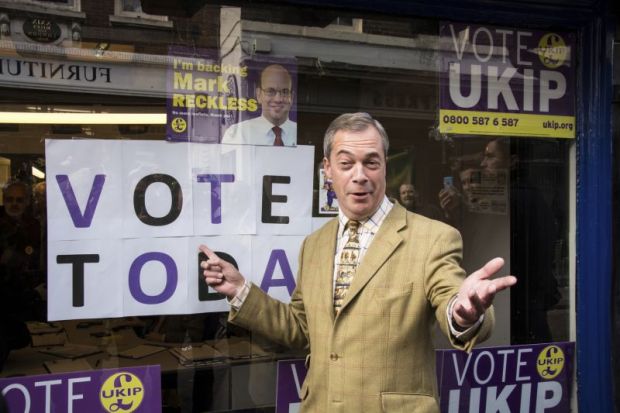“People in this country have had enough of experts” was how Michael Gove, one of the leading figures in the campaign to get the UK out of the European Union, infamously responded to warnings against Brexit from economists.
Now he has gone further, using a Nazi-era comparison to question their judgement. “Albert Einstein during the 1930s was denounced by the German authorities for being wrong and his theories were denounced, and one of the reasons of course he was denounced was because he was Jewish,” he told LBC Radio.
"They got 100 German scientists in the pay of the government to say that he was wrong and Einstein said: 'Look, if I was wrong, one would have been enough.’''
The academy has been all but unanimous in its support for Remain, stressing the tangible benefits of student mobility, research links and EU grant programmes.
But as Gove’s comments suggest, a vote for Brexit tomorrow would also mark a deeper, cultural defeat for universities. Brexit would be a victory for a part of British society that appears to have very little trust in academic expertise.
A YouGov poll conducted last week found that just one in five Leave voters trusted economists on the EU referendum, compared with more than 60 per cent of remainers.
Fair enough, some might think – economists have been in the doghouse since the financial crisis.
But Leave voters’ scepticism extends to all academics. Just one in four trust academics on the referendum, while 54 per cent do not trust them. By contrast, nearly seven in 10 Remain supporters trust academics.
Brexit voters are equally, if not more sceptical of almost all the other groups put forward by YouGov. As the pro-Remain campaigning group Scientists for EU put it on Twitter: “Remainers trust academics, business, economists & distrust politicians, journalists. Brexiteers trust NO-ONE. WTF”. Other suspicions abound: nearly half of Leave voters think that is likely the referendum will be rigged.
Remainers trust academics, business, economists & distrust politicians, journalists.
Brexiteers trust NO-ONE
WTF pic.twitter.com/JRv4NtOBGt
— Scientists for EU (@Scientists4EU) June 16, 2016
If Leave wins, victorious politicians such as Gove will know they have won by rubbishing expert opinion and galvanising the votes of those who do not believe academics.
This could be ominous indeed for the future of academic evidence in policymaking, particularly on issues such as climate change. If expert research can be disregarded on an issue as important as the EU referendum, why bother funding it to look into other social, economic or medical questions?
But I’m not sure if universities are entirely blameless in this lack of trust. Academic views can hardly be expected to perfectly mirror the rest of the population. Still, there is such a strong liberal and leftward tendency on campuses that some distrust from those on the Right seems inevitable.
In a poll before the 2015 general election, Times Higher Education found that more than four in five higher education staff planned to vote for Labour, the Greens, Liberal Democrats or Scottish National Party. Just 11 per cent said that they would vote Conservative.
When the Tories won, it triggered an outburst from Rebecca Roache, a philosophy lecturer at Royal Holloway, University of London, who said she no longer wanted to be friends with Conservatives, and argued supporting the party was “as objectionable as expressing racist, sexist, or homophobic views”.
Furthermore, our referendum poll last week found that nine in 10 university staff support remaining in the EU. UK universities have also presided over the emergence of a campus culture in which more than one in four students believes that UKIP should be banned from speaking.
With universities so bereft of Brexiteers, is it unreasonable if Leave voters treat academic research on controversial subjects such as the impact of EU migration with greater scepticism than normal?
Scepticism is not the same as outright Gove-style anti-intellectualism, of course. But regardless of which way the country votes tomorrow, academics and universities urgently need to ponder why such a significant chunk of the population has come to distrust them.
Register to continue
Why register?
- Registration is free and only takes a moment
- Once registered, you can read 3 articles a month
- Sign up for our newsletter
Subscribe
Or subscribe for unlimited access to:
- Unlimited access to news, views, insights & reviews
- Digital editions
- Digital access to THE’s university and college rankings analysis
Already registered or a current subscriber? Login








